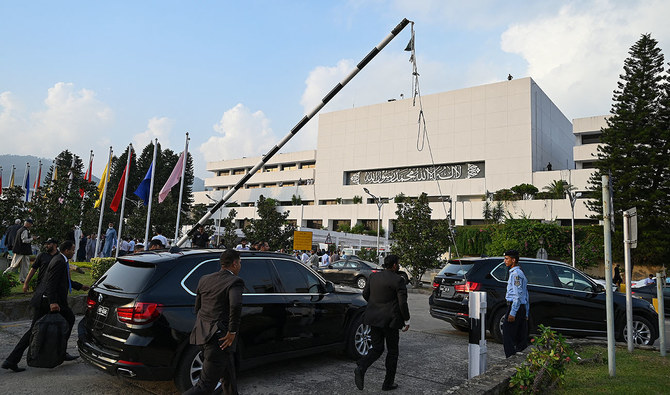ISLAMABAD: After days of political uncertainty following the February 8 national polls, the National Assembly of Pakistan will hold its inaugural session on February 29 for the oath-taking ceremony of the newly elected lawmakers and to determine who will serve as the next speaker and deputy speaker of the house.
The country’s general elections earlier this month resulted in a split mandate, with independent candidates backed by former prime minister Imran Khan’s Pakistan Tehreek-e-Insaf (PTI) party emerging as the single largest bloc in the lower house of parliament. These candidates could not contest the polls from the PTI platform after the party lost its election emblem in a legal battle.
With their status as independent lawmakers, they could not form the government under the law or lay claim to the reserved seats for women and minority religious communities to bolster their numbers.
The situation benefited other political factions, helping the Pakistan Muslim League (PML-N) of three-time ex-premier Nawaz Sharif to negotiate a power-sharing agreement with Bilawal Bhutto-Zardari’s Pakistan Peoples Party (PPP) to form a coalition government.
The relatively prolonged negotiations between the two parties led to uncertainty about the exact schedule of the first National Assembly session, though it is constitutionally required to be convened no later than 21 days of the elections, or February 29 in this case.
“The National Assembly session will be held on February 29 at 11am,” a senior official at the assembly secretariat told Arab News on condition of anonymity. “The secretariat has convened the session as we cannot go beyond it as per the constitution.”
Earlier in the day, local media reported the speaker of the outgoing assembly, Raja Pervaiz Ashraf, had called the session on February 29 after President Arif Alvi’s refusal to do it.
Alvi, who contested the 2018 elections on the PTI ticket and is considered Khan’s close aide, was said to have objected that the house was still incomplete since the Election Commission of Pakistan (ECP) had yet to decide the issue of reserved seats in parliament.
Former finance minister and senior PML-N leader, Ishaq Dar, told the media in Islamabad the president was in violation of the constitution once again after returning the summary to summon the session.
“Article 91 (2) of the constitution is very clear [on this issue],” he noted. “It says, ‘The National Assembly shall meet on the twenty-first day following the day on which a general election to the Assembly is held, unless sooner summoned by the President.’”
He said this implied that the assembly session will now be “automatically held on 29th February.”
Meanwhile, the ECP also issued a notification, saying it was mandatory to conduct the presidential election within 30 days of the national polls.
“On February 29, 2024, all assemblies will come into existence, thereby completing the required Electoral College for the election of the President,” it said. “The Election Commission will issue the schedule for the election of the President and the public notice on March 1, 2024.”
Pakistan’s National Assembly to convene inaugural session on Feb. 29 for lawmakers’ oath-taking
https://arab.news/v7bff
Pakistan’s National Assembly to convene inaugural session on Feb. 29 for lawmakers’ oath-taking

- A PML-N leader maintains Article 91 (2) clearly says the assembly session will be ‘automatically held on 29th February’
- The ECP says it will issue the schedule of presidential elections on March 1, a days after assemblies come into being
Pakistan bank enables Shariah-compliant digital payment facility for passengers at Islamabad airport
Pakistan bank enables Shariah-compliant digital payment facility for passengers at Islamabad airport

- Pakistan is a cash-dominated market where a significant portion of transactions in the informal sector are made without any taxes, officials say
- The move comes amid Pakistan’s efforts to introduce a cashless model at airports under which only digital service providers can provide services
KARACHI: Aik, Pakistan’s first Islamic digital bank, has enabled fully digital payments at Islamabad International Airport to offer travelers and passengers secure, Shariah compliant digital transaction facility.
The development comes amid Pakistan’s efforts to introduce a cashless model at airports across the country, under which only digital service providers can provide services to customers.
Aik, a subsidiary of Bank Islami, said it has onboarded merchants across the Islamabad airport and integrated QR code deployments at key touchpoints to allow passengers and visitors to make secure, seamless, and Shariah-compliant digital transactions at all counters, retail outlets, and service points.
It said the implementation complies with the regulations and framework set by the State Bank of Pakistan (SBP) and is a working model for a large-scale adoption of cashless systems in public infrastructure.
“This deployment reflects our commitment to building practical digital infrastructure that improves everyday transactions,” Aik Chief Officer Ashfaque Ahmed said in a statement.
“By enabling a fully cashless environment at a major national gateway, we are supporting efficiency, transparency, and financial inclusion at scale. This is not only a project; it is a foundation for Pakistan’s cashless future.”
Pakistan is a cash-dominated market where a significant portion of transactions, particularly in the informal sector, are conducted in cash. Officials say many of these transactions are aimed at avoiding taxes.
In recent years, the SBP has taken steps to ensure a transition toward a more cashless economy so that transactions are more traceable, reducing chances of tax evasion and corruption.
By digitizing Islamabad airport, aik said it continues to invest in secure and accessible financial solutions that “expand digital participation and support national economic modernization.”









